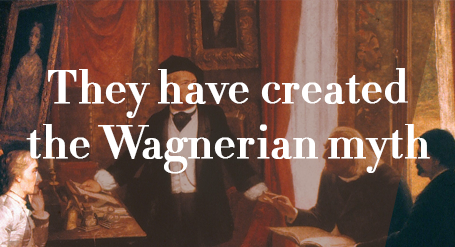
If Wagner was the cultural and musical chronicler of his time, if he remained a revolutionary activist, he had also gone into the act of police, and if he was finally his master of Bayreuth celebrated as the one of the major artist of his At the time, the illustrious composer did not live before a man made of chair and blood, animated by passions, with a sometimes violent, sometimes facetious, and sometimes tender character.
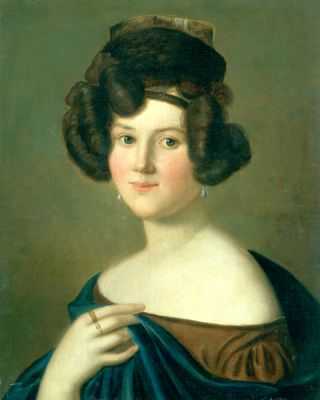
THOSE RELATED ARTICLES MAY
INTEREST YOU
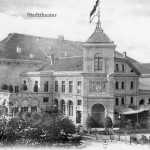 KÖNIGSBERG
KÖNIGSBERG
After the failure he suffered in Magdeburg, Richard Wagner was deep in debt; the composer and music director of the troupe of which he tried a final rescue personally went into debt. Having to find a new job, Wagner went to Berlin for the first time in May 1836, hoping to be appointed as Kapellmeister at the Theatre in Königsberg. (read more…)
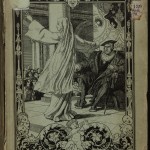 DAS LIEBESVERBOT, WWV38 (The ban of Love)
DAS LIEBESVERBOT, WWV38 (The ban of Love)
Grand opera (singspiel) in two acts
Text and music by Richard Wagner,
after Shakespeare’s play Measure for Measure
Premiere: 19th march 1836, Magdeburg, led by the composer (read more…)
 RIGA
RIGA
On August 21, 1837, Richard Wagner landed alone in Riga, with the prospect of occupying the post of conductor at the town theatre. Before leaving Berlin and in a desperate attempt to bring Minna back to the marital home (the couple had gone through many “crises” during their first years together), the composer wrote to his wife: “Riga has been described to me as the most beautiful place in the world…” (read more…)
WAGNER Christine Wilhelmine (Minna) born PLANER
(Born on 5. September, 1809 – died on 25. January, 1866)
Actress, Richard Wagner’s first wife
Richard Wagner’s first wife, Minna’s personality was very often degraded, and even caricatured… to the point of portraying her as a sour wife and who could even have broken her colossal husband’s career. If the reciprocal infidelities succeeded an equally reciprocal lack of understanding, the fact remains that, thanks to her pragmatic temperament and her determination to obtain authorisation for Wagner’s return to his homeland while he was exiled, Minna, an actress who had a light-hearted temperament in her early years, took – as years and the misadventures inflicted by the composer’s hesitant beginnings went by – on a darker but also more responsible face: the face of Richard Wagner’s hidden success.
![]() Minna or The Freedom to love
Minna or The Freedom to love
“Erste Liebhaberin“… Job as a First lover, young heroine, “white goose” or even “delightful idiot“: this is how the tender but somewhat inconsistent theatre roles of the early XIXth century in Germany were called. Roles that were played by Minna…
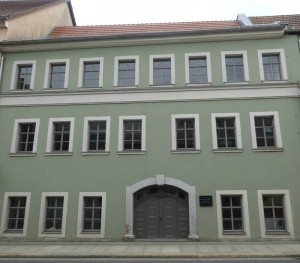 Born in Oederean (Saxony) of a trumpet player father in the army, the young Minna Planer did not have the happiest nor the richest childhood. The young girl was raised in the greatest poverty: she inherited a certain form of pragmatic intelligence. Seduced at a young age (she was fifteen years old) by the gildings of a uniform that was named Ernst Rudolf von Einsiedel, a captain of the Saxon Army Guards, the young Minna burned her own wings with the fire of that passion that went nowhere, except for a little girl she named Nathalie, and that she gave birth to in the utmost discretion, at relatives’ home. And whom she named with her own name, Planer. Thus it would be easier to afterwards pose her in society as her own sister: to avoid dishonor certainly, by vanity perhaps and to hide her age and her responsibilities as a mother, thereafter.
Born in Oederean (Saxony) of a trumpet player father in the army, the young Minna Planer did not have the happiest nor the richest childhood. The young girl was raised in the greatest poverty: she inherited a certain form of pragmatic intelligence. Seduced at a young age (she was fifteen years old) by the gildings of a uniform that was named Ernst Rudolf von Einsiedel, a captain of the Saxon Army Guards, the young Minna burned her own wings with the fire of that passion that went nowhere, except for a little girl she named Nathalie, and that she gave birth to in the utmost discretion, at relatives’ home. And whom she named with her own name, Planer. Thus it would be easier to afterwards pose her in society as her own sister: to avoid dishonor certainly, by vanity perhaps and to hide her age and her responsibilities as a mother, thereafter.
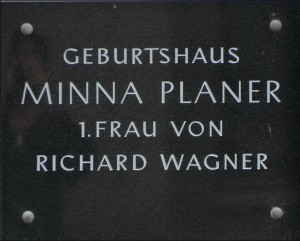 Very quickly, the young woman managed to break into an acting career on the stage of the theatres of Dessau, Altenburg, Magdeburg and Dresden. With a certain aplomb and a form of heroism: since she was pretty, Minna knew how to take advantage of that rare grace that the Gods had given her. She was therefore a “leading lady“, a young heroine, but with charm, acting intelligence and even a certain talent. She dictated her own conditions: to never be the second on stage, to always play the leading role, for the sum of 600 thalers, in addition to the paid living expenses. And let’s not forget a few casual affairs… to further kindle the love of her admirers. Some would have even duelled for the young actress, at least that is how the legend (invented by her) speaks of the young woman, no testimony proving this reality. But no matter: her ambition was to shine on stage and conquer the hearts of men. Her unfortunate early affair with the soldier certainly left a taste of revenge to take.
Very quickly, the young woman managed to break into an acting career on the stage of the theatres of Dessau, Altenburg, Magdeburg and Dresden. With a certain aplomb and a form of heroism: since she was pretty, Minna knew how to take advantage of that rare grace that the Gods had given her. She was therefore a “leading lady“, a young heroine, but with charm, acting intelligence and even a certain talent. She dictated her own conditions: to never be the second on stage, to always play the leading role, for the sum of 600 thalers, in addition to the paid living expenses. And let’s not forget a few casual affairs… to further kindle the love of her admirers. Some would have even duelled for the young actress, at least that is how the legend (invented by her) speaks of the young woman, no testimony proving this reality. But no matter: her ambition was to shine on stage and conquer the hearts of men. Her unfortunate early affair with the soldier certainly left a taste of revenge to take.
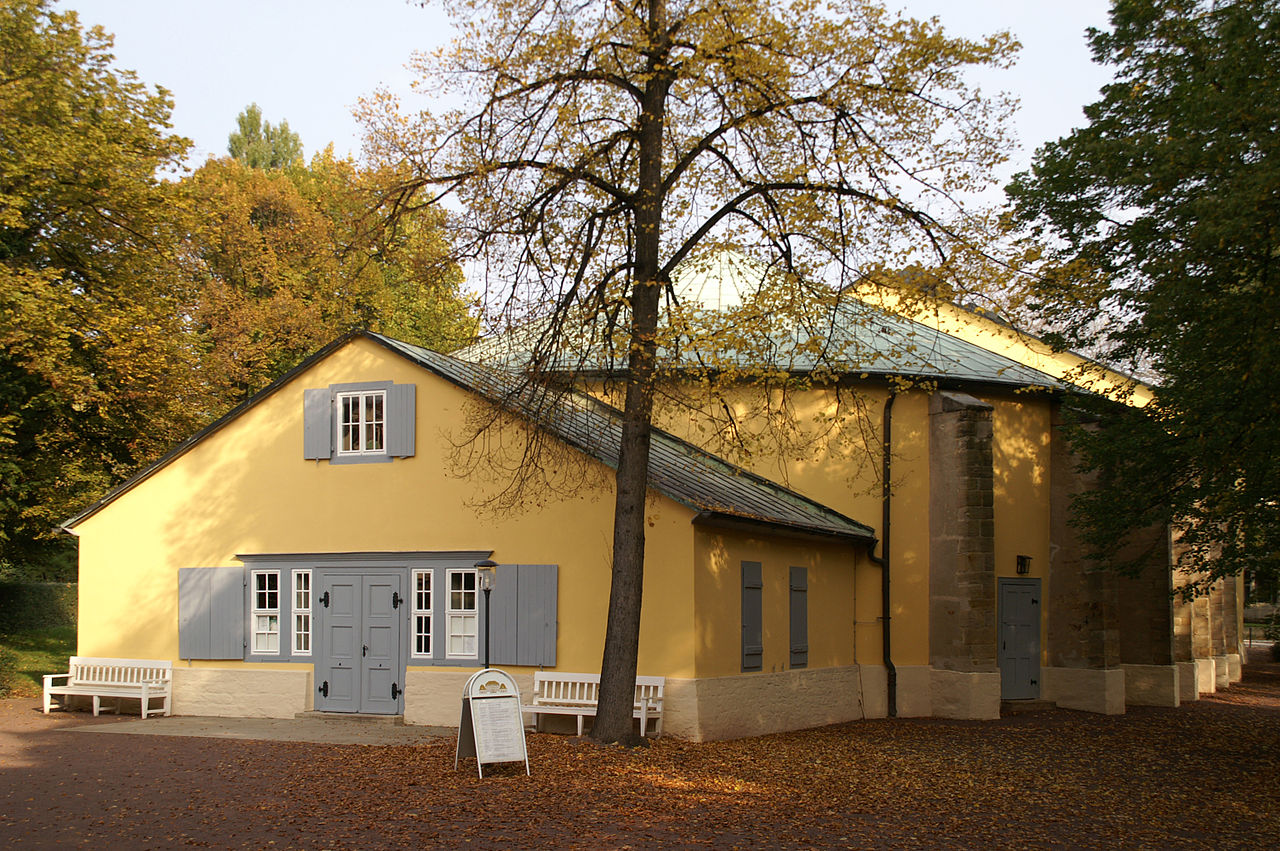 When she met the young Richard Wagner at the end of July 1834, he was still a very young composer who was only twenty-one years old; she was barely five years older than him. To his credit there were only a small number of pieces for orchestras, but he had lots of projects on his mind, including an opera, The Fairies, which had never been performed before. Did Minna even know who she was dealing with? Undoubtedly, no. During this summer spent in the spa resort Bad Lauchstädt, near Halle (the composer was invited there by the Bethmann Theatre Company of Magdeburg when he himself was musical director at the theatre of the small German town), the composer multiplied the romantic conquests.
When she met the young Richard Wagner at the end of July 1834, he was still a very young composer who was only twenty-one years old; she was barely five years older than him. To his credit there were only a small number of pieces for orchestras, but he had lots of projects on his mind, including an opera, The Fairies, which had never been performed before. Did Minna even know who she was dealing with? Undoubtedly, no. During this summer spent in the spa resort Bad Lauchstädt, near Halle (the composer was invited there by the Bethmann Theatre Company of Magdeburg when he himself was musical director at the theatre of the small German town), the composer multiplied the romantic conquests.
 But if there was one who shone more than the others in the eyes of the fiery composer, it was indeed Minna! Very quickly, the words between the two young lovers got impassioned. For there was passion in Minna, a carnal passion. These passions that, when one is a composer, one draws inspiration from to build the most free and cheerful music. For Wagner, it was The Ban on Love, an opera he intended to create at his theatre in Magdeburg. Between him and Minna, it was rather… The Freedom to love.
But if there was one who shone more than the others in the eyes of the fiery composer, it was indeed Minna! Very quickly, the words between the two young lovers got impassioned. For there was passion in Minna, a carnal passion. These passions that, when one is a composer, one draws inspiration from to build the most free and cheerful music. For Wagner, it was The Ban on Love, an opera he intended to create at his theatre in Magdeburg. Between him and Minna, it was rather… The Freedom to love.
![]() Frau Minna Wagner
Frau Minna Wagner
Cosima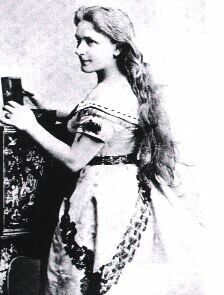 , Richard Wagner’s second wife, did not have the privilege of playing the role of nurse alone with the august composer. Immediately after moving in together, shortly after meeting in the summer of 1834, Richard got ill. With a facial erysipelas, with which he struggled all his life. And already – they were not yet engaged – Minna was at her beloved’s bedside. With devotion, affection, and without calculation: Minna did not need Wagner to keep shining on the stages of the little German theatres. And besides, the actress, apart from the love she had for Wagner, did not slow down the ardour of her lovers: her being in a relationship did not mean that she would order her admirers to stop proving their feelings…
, Richard Wagner’s second wife, did not have the privilege of playing the role of nurse alone with the august composer. Immediately after moving in together, shortly after meeting in the summer of 1834, Richard got ill. With a facial erysipelas, with which he struggled all his life. And already – they were not yet engaged – Minna was at her beloved’s bedside. With devotion, affection, and without calculation: Minna did not need Wagner to keep shining on the stages of the little German theatres. And besides, the actress, apart from the love she had for Wagner, did not slow down the ardour of her lovers: her being in a relationship did not mean that she would order her admirers to stop proving their feelings…
This had a knack for arousing in Wagner the most profound exasperation (and jealousy). Is that why he asked Minna’s hand in marriage so quickly… when she could escape him? Especially since the composer’s career in Magdeburg did not really begin under the best auspices! His first creations in loco were not really as successful as hoped, to say the least: his Overture and stage music for Christopher Columbus (Columbus, WWV27) composed for the drama by Theodor Apel were complete flops. There was – and there had been during his lifetime – a fear of not being loved in Richard Wagner, and this was found since his earliest childhood, not that he was an unhappy child, but most likely not as loved by his mother as he would have wanted (Johanna Rosine apparently did not have “the strongest” maternal instinct). Undoubtedly feeling that his beautiful actress’ esteem for him could fade, Richard asked Minna to marry him in February 1835 (Letter from Richard Wagner to his brother Albert).
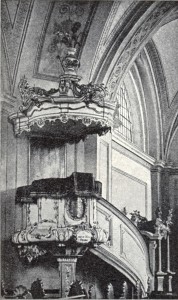 While Wagner, who had just taken up his post in Magdeburg, met with failure after failure and began to accumulate his first debts – the composer invested his own funds to desperately try to save the troupe of the theatre he ran – tension rose in the relationship. Minna temporarily left the Magdeburg troupe and while Wagner implored her in passionate letters to come back home, the actress escaped; to try to brave new challenges in her career, perhaps also to escape Wagner. In Berlin, first of all, on the stage of the Königstadt Theatre. For Wagner, the Magdeburg adventure ended in total panic (after the failure of the performance of The Ban on Love), misfortune and disillusionment. But he was summoned to take the responsabilities of music director (Musikdirektor) of the Königsberg Opera, although “the situation (was) uncertain” as he later wrote in Mein Leben. A new position, new responsibilities, a more stable theatre… a more comfortable situation? While he was hardly settled in and waiting for the final promulgation of his post, Wagner wrote to Minna, this time to ask her to marry him. Minna agreed: the marriage was celebrated on 24 November, 1836 in the small church of Tradheim, in Königsberg.
While Wagner, who had just taken up his post in Magdeburg, met with failure after failure and began to accumulate his first debts – the composer invested his own funds to desperately try to save the troupe of the theatre he ran – tension rose in the relationship. Minna temporarily left the Magdeburg troupe and while Wagner implored her in passionate letters to come back home, the actress escaped; to try to brave new challenges in her career, perhaps also to escape Wagner. In Berlin, first of all, on the stage of the Königstadt Theatre. For Wagner, the Magdeburg adventure ended in total panic (after the failure of the performance of The Ban on Love), misfortune and disillusionment. But he was summoned to take the responsabilities of music director (Musikdirektor) of the Königsberg Opera, although “the situation (was) uncertain” as he later wrote in Mein Leben. A new position, new responsibilities, a more stable theatre… a more comfortable situation? While he was hardly settled in and waiting for the final promulgation of his post, Wagner wrote to Minna, this time to ask her to marry him. Minna agreed: the marriage was celebrated on 24 November, 1836 in the small church of Tradheim, in Königsberg.
![]()
Königsberg, Riga, Paris: the Wagners’ disillusionments
When Wagner was finally appointed as musical director in Königsberg (East Prussia), he had high hopes for this new position. However there were again only successive disillusionments. As soon as he was appointed, the management of the theatre announced the bankruptcy of the ensemble (it turned out to have been more of a curse than a blessing). If the blow was rough for Wagner, Minna, who had just married, could not bear any more than that. She had to continuously deal with the creditors not only from the town they were then living in but also the old ones from Magdeburg who demanded the payment of debts. The couple got bogged down in financial hell, and that of couples in crisis. Minna fled to Dresden with her daughter Nathalie on 31 May, 1837, accompanied by a local merchant named “Dietrich”. For the first time, Wagner’s name became unbearable to her. In a blind rage, Wagner began pursuing his wife: while he found her and she refused to follow him, the composer considered a divorce for the first time.
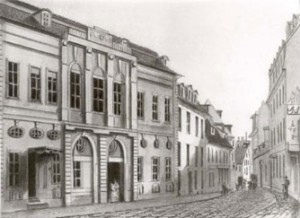
Vexed, Wagner returned to Königsberg, from where he was summoned to Riga, a richer city with more certain promises of success (the city of Riga then had a rich Germanic community, and the direction of the German Theatre offered to Wagner resonated as a mark of success). It was thus alone that Wagner went to Riga. Once established, he begged his wife to come and join him there. The appeal was tempting for Minna (especially since her relationship with Dietrich did not meet her expectations), and Wagner redoubled his arguments to convince his wife to join him. In a letter dated 19 October, 1837, Minna said at once “Sorry!” to her husband, left Dietrich and considered giving up her own theatre career (NB: Minna said her definitive farewells on the stage of the Riga Theatre on 18 April, 1839 in the title role of Marie Stuart by Schiller).
If the infidelity stopped dead with the resumption of everyday life in Riga, Minna continued to live the hell of misery. Constrained by new debts, the Wagners fled, hoping to reach Paris. Pursued by the creditors (and the Cossacks!), Minna, Wagner and the Newfoundland Robber boarded a cart which was to take them to Pillau, from where they reached London, then Paris by sea. During this frantic race, on July 14, 1839, the boat capsized: Minna was deeply wounded. This accident could have led to her inability to give Wagner children afterwards.
The Dantesque crossing of the Baltic Sea and then of the North Sea was only the prelude to the hell of misery that the couple lived for more than two years in Paris. But Minna – in all likelihood deeply hurt by her accident, and faced with the physical inability to flee again, but where could she have fled? – was henceforth always at Wagner’s side. Until the latter provoked the reasons for the definitive split.
![]()
The Dresden “marital break”… and the other side of the coin : Jessie Laussot and Mathilde Wesendonck
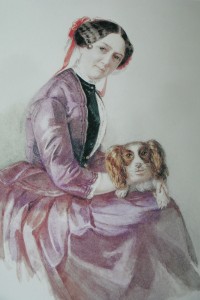 In April 1842, Richard Wagner was called to Germany by promises of glory. Finally, his work could get the recognition it truly deserved: in Dresden where his opera Rienzi was accepted; in Berlin where The Flying Dutchman was for a moment (only one) considered. It was necessary for him to return to Germany, and quickly, in order to supervise the rehearsals of Wagner’s (German) “Grand Opéra à la française“. After the triumph of Rienzi came the successes (more reserved, but granting notoriety and popular favour) of The Flying Dutchman, then of Tannhäuser. This notoriety thus allowed him to rise to be choirmaster (Kappelmeister) – on 2 February, 1843 – a position whose very heavy responsibility Wagner already anticipated. But Minna urged her husband to accept because she hoped it would bring the material comfort that was so absent until then. The Dresden years that finally saw Wagner’s success come to fruition, sounded like a truce in the hell that was the everyday life of the Wagners. A short truce however. For Wagner did not intend to only get involved in music. Or, to be more precise, music seemed inseparable from politics to him: the composer who also wanted to be a theoretician could not remain indifferent anymore to the events that rose the people of Dresden, despite Minna’s prayers who tried to dissuade him many times, and asked him to only devote himself to composition.
In April 1842, Richard Wagner was called to Germany by promises of glory. Finally, his work could get the recognition it truly deserved: in Dresden where his opera Rienzi was accepted; in Berlin where The Flying Dutchman was for a moment (only one) considered. It was necessary for him to return to Germany, and quickly, in order to supervise the rehearsals of Wagner’s (German) “Grand Opéra à la française“. After the triumph of Rienzi came the successes (more reserved, but granting notoriety and popular favour) of The Flying Dutchman, then of Tannhäuser. This notoriety thus allowed him to rise to be choirmaster (Kappelmeister) – on 2 February, 1843 – a position whose very heavy responsibility Wagner already anticipated. But Minna urged her husband to accept because she hoped it would bring the material comfort that was so absent until then. The Dresden years that finally saw Wagner’s success come to fruition, sounded like a truce in the hell that was the everyday life of the Wagners. A short truce however. For Wagner did not intend to only get involved in music. Or, to be more precise, music seemed inseparable from politics to him: the composer who also wanted to be a theoretician could not remain indifferent anymore to the events that rose the people of Dresden, despite Minna’s prayers who tried to dissuade him many times, and asked him to only devote himself to composition.
But it was no longer about fairies for Wagner, no more enchanted kingdoms, nothing but fire and barricades, which got him banished outside the borders of Germany: on 16 May, 1849, the judgement that decreed Wagner “insurrectional” and that decided on his arrest was pronounced. Richard had to flee so as not to risk his life. Minna, who was for that matter suffering from cardiac problems and who was increasingly under the influence of laudanum, did not follow him. Without definitely giving up on her husband.
 Wagner, forced into exile, tried twice to escape through love. The first was called Jessie Laussot, an English music lover who lived with her mother and her husband in the surrounding area of Bordeaux, the second, Mathilde Wesendonck, in Zurich, in a beautiful property offered to the composer by her own husband. Although Minna survived the “Bordeaux affair”, the separation with Mathilde that she imposed on Richard got the better of their relationship. At the end of the “Zürich idyll“, each of the two spouses went their separate ways. Richard, to Venice, Minna, deeply hurt by the affair (which, in her absence, had given birth to Tristan and Isolde – besides Wagner’s wife hated this work, was it this surprising? – destroyed so to speak), did a series of sometimes quite hazardous cures and medical treatments. The couple hanged by a virtually invisible thread.
Wagner, forced into exile, tried twice to escape through love. The first was called Jessie Laussot, an English music lover who lived with her mother and her husband in the surrounding area of Bordeaux, the second, Mathilde Wesendonck, in Zurich, in a beautiful property offered to the composer by her own husband. Although Minna survived the “Bordeaux affair”, the separation with Mathilde that she imposed on Richard got the better of their relationship. At the end of the “Zürich idyll“, each of the two spouses went their separate ways. Richard, to Venice, Minna, deeply hurt by the affair (which, in her absence, had given birth to Tristan and Isolde – besides Wagner’s wife hated this work, was it this surprising? – destroyed so to speak), did a series of sometimes quite hazardous cures and medical treatments. The couple hanged by a virtually invisible thread.
![]() Paris and the last years
Paris and the last years
The final blow was dealt a few years after the Zurich and the Wesendoncks Villa accident, while Wagner again attempted, in 1860, to take on the French capital, with the production in French and on the Parisian stage of Tannhäuser… and the particularly resounding failure that it infamously was. The Wagners – who were unprepared for this affront, both artistic and personal – took it with full force, and sounded the death knell of a couple that had not got on with each other for a long time. At the end of this last debacle, each one again went their separate ways and Wagner continued his exile, alone.
The last meeting between Minna and Richard took place in February 1862 in Biebrich, while the composer was in the midst of creating the Master-Singers of Nuremberg (he had succumbed to the charm of a new inspiration called, this time, Mathilde Maier). This last visit was described by Wagner as “ten days of hell“.
The Richard-Minna couple did not see each other again (their last meeting dating from November of the same year). On several occasions and in the last years of their relationship, Wagner had exhorted Minna to accept the divorce: the one that always presented herself with a tireless resolution to the Court of the King of Saxony in order to get her husband’s disgrace annulled (which she eventually obtained in 1862, but it did not bring her husband back) always refused this too easy outcome to their marital problems. When Wagner met King Ludwig II of Bavaria, Minna withdrew almost with a sense of modesty from the Wagnerian scene, aware that she had played her role – an overwhelming but dominating role in her husband’s career – as she wrote to their mutual friend Ernst Benedikt Kietz: “I have not seen my good, wonderful husband for nearly two and a half years. He is happy and lives in Munich in the luxury of the young King of Bavaria; now he does not need me anymore” (Letter from Minna to Ernst Benedikt Kietz, 28 March, 1864).
Whereupon, Minna Planer, Wagner’s wife, died of a heart attack on 25 January, 1866. She now rests in the cemetery in Dresden, the city in which she lived her happiest hours with Richard Wagner.
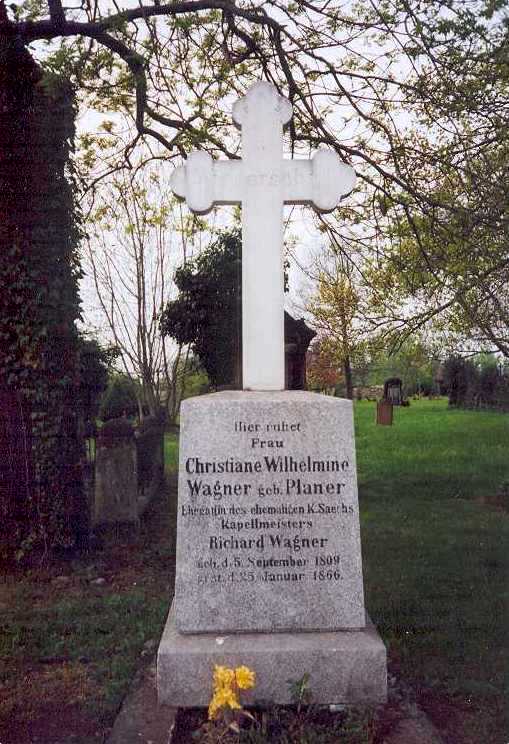
NC
If you wish to share further information about this article, please feel free to contact us !